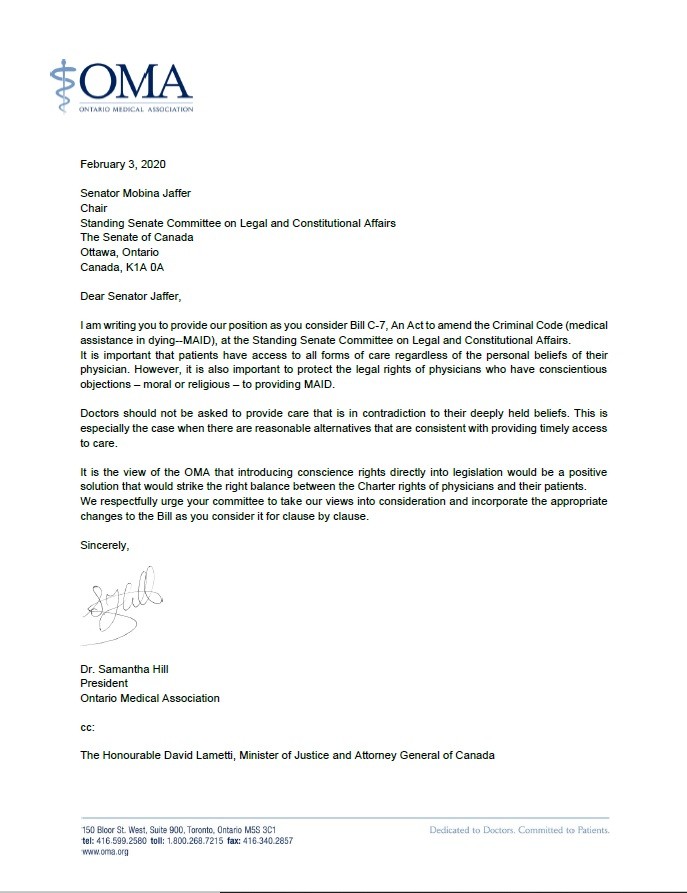Letter to Canadian Senators, Elected Federal & Provincial Leaders, and Regulators
Tyler White, Graydon Nicholas, Nick Sibbeston, Alika Lafontaine, Lana R. Potts, Rosella Kinoshameg, Bob Sutherland, Troy Hunter, Howard Jolly, Rennie Nahanee, Kenny Blacksmith, Travis Gladue-Beauregard, Karen Sibbeston, Vincent Solomon, Barry C. Maracle
As Indigenous people in Canada, we have grave concerns over the implications of Bill C-7 on our communities.
The expansion of “Medical Assistance in Dying” (MAiD) beyond those whose death is foreseeable will have a lasting impact on our vulnerable populations. Not only has the consultation of Bill C-7 with our leaders been inadequate, it has not taken into account the existing health disparities and social inequalities we face compared to non-Indigenous people.
As sovereign nations in Canada, we have a right in determining how health services will be delivered in our communities, and the Government of Canada has a responsibility to respect this relationship.
Bill C-7 goes against many of our cultural values, belief systems, and sacred teachings. The view that MAiD is a dignified end for the terminally ill or those living with disabilities should not be forced on our peoples.
Given our history with the negative consequences of colonialism and the involuntary imposition of cultural values and ideas, we believe that people should not be compelled to provide or facilitate in the provision of MAiD. Furthermore, our population is vulnerable to discrimination and coercion in the healthcare system, and should be protected against unsolicited counsel regarding MAiD.
These civil measures should extend to all Canadians.
Regardless of one’s opinion of MAiD, the right to self-determination and to act on one’s conscience is recognized as a fundamental freedom in all peoples. We call on the Government of Canada to recognize the value of Aboriginal healing practices by respecting Indigenous peoples’ right to self-determination in spiritual matters, including the right to practise our own traditions and customs when supporting those who are dying, without discrimination in the health care system.
SIGNATORIES
Tyler White.
Chief Executive Officer,
Siksika Health Services, Siksika Nation;
Member of Blackfoot Confederacy and Treaty 7 of Alberta.
Honourable Graydon Nicholas.
Order of New Brunswick,
First Indigenous Lieutenant Governor of New Brunswick,
Member of Wolastoqey Nation.
Honourable Nick Sibbeston.
Retired Senator,
Former Premier,
Northwest Territories.
Dr. Alika Lafontaine MD, FRCPC,
Anesthesiologist
Past President, Indigenous Physicians Association of Canada.
Dr. Lana R. Potts BScN MD CCFP.
Indigenous Health Advisor,
Blackfoot Family Physician with Specialty in Indigenous Health;
Blackfoot Ceremonialist;
Member of Racism and Discrimnation Working Group of the
Federal Medical Regulatory Authorities of Canada;
Member of Indigenous Advisory at the University of Lethbridge, Alberta.
Rosella Kinoshameg. Elder, DSL hc., RN., B.Sc.N.,
Indigenous Palliative Care Consultant,
Wiikwemkoong Unceded Territory, Ontario.
Bob Sutherland.
Elder and Traditional Health Worker
Member of Moose Cree First Nation
Troy Hunter.
Indigenous Lawyer, New Columbia Law Corporation,
Member of Ktunaxa Nation, British Columbia.
February 2021
Howard Jolly.
Executive Director, First Nations Alliance Churches of Canada;
Member of the Eeyou Cree Nation, Quebec.
Deacon Rennie Nahanee.
Elder, Squamish Nation;
Volunteer at Lionsgate Hospital for Squamish People;
Advisor for Suicide Prevention for Squamish Nation, British Columbia.
Chief Kenny Blacksmith.
Former Deputy Grand Chief of Eeyou Cree Nation;
KLB Resources Inc/Chief Essential Oils;
Member of the Cree Nation of Mistissini, Quebec.
Travis Gladue-Beauregard,
Operations Director of The Buffalo Tribune;
Columnist and Writer. Former Service Member.
Member of Bigstone Cree Nation, Alberta. Treaty 8 Territory.
Karen Sibbeston. Elder,
Dene Nation, Northwest Territories.
Vincent Solomon.
Urban Indigenous Ministry Developer,
Diocese of Rupert’s Land, Winnipeg, Manitoba.<br.
Barry C. Maracle.
Founder of TakeCharge Ministries.
Mohawk from Tyendinaga Mohawk Territory, Ontario
